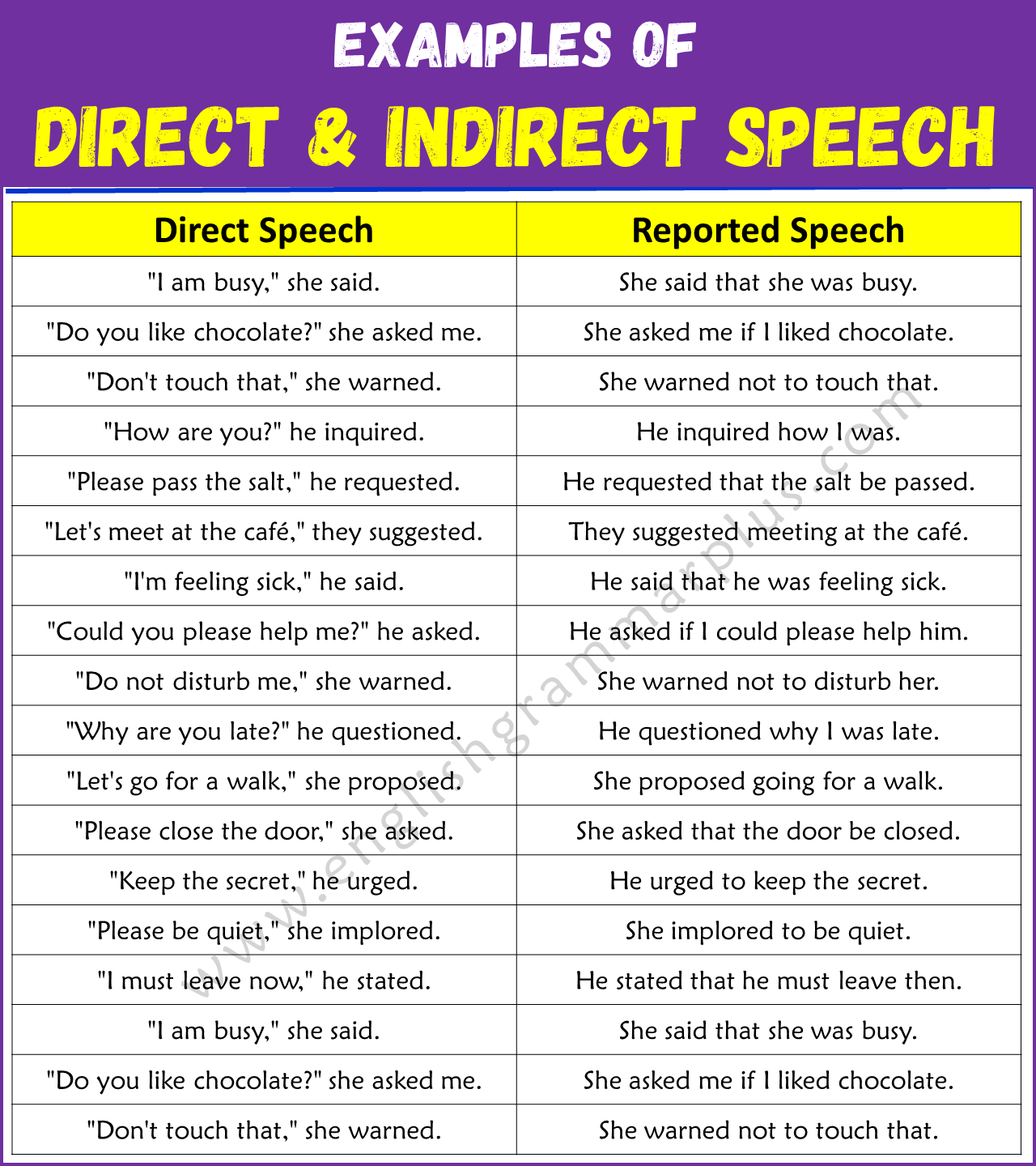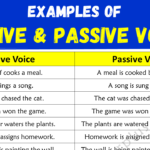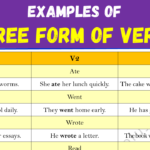In this useful lesson, we’ll explore direct and indirect speech through 50 simple examples. These two ways of speaking help us share what someone else said. Think of direct speech as using the speaker’s exact words, like quoting a friend. Indirect speech, on the other hand, involves changing the original words a bit, as if you’re telling a story about what was said. This lesson is great for anyone looking to get better at English, offering clear examples to make learning easier.
Rules to Make Direct and Indirect Speech
When converting direct speech into indirect speech, it’s important to follow specific rules to ensure the sentence still conveys the original meaning. Here are the key rules:
- Change in Pronouns: Pronouns often need to be changed according to the context and the point of view of the reporting verb. For example, “I am going” (direct) might become “He said he was going” (indirect).
- Tense Shifts: The tense of the verb in direct speech usually changes when converting to indirect speech. If the reporting verb is in the past tense, the tense in the reported speech shifts back as well. For instance, “She said, ‘I am eating‘” changes to “She said she was eating“.
- Time and Place Words: Words indicating time and place in direct speech are often adjusted in indirect speech. “Here” may change to “there,” “today” to “that day,” “tomorrow” to “the next day,” etc.
- Question Form: If the direct speech is a question, the indirect form does not use a question format. Instead, it integrates the question into a statement, often using “if” or “whether” for yes/no questions, and ‘wh’ words (what, when, where, why, who) for questions that require more detailed answers. For example, “He asked, ‘Are you coming?‘” becomes “He asked if I was coming.”
- No Quotes: In indirect speech, quotation marks are not used. The sentence is integrated into a larger statement, which often starts with verbs like said, asked, or told.
- Exclamations and Commands: Exclamatory sentences and commands in direct speech are transformed into statements or requests in indirect speech. For instance, “He said, ‘How beautiful!'” becomes “He exclaimed that it was beautiful.” Commands like “He said, ‘Sit down!'” change to “He ordered me to sit down.”
- Modal Verbs: Modal verbs can also change in indirect speech, especially might, could, would, and should, depending on the context and the necessity to maintain the original sentence’s meaning.
Remember, the goal of these changes is to maintain the essence of the original statement while adapting it to the grammatical and contextual framework of indirect speech.
Examples of Direct and Indirect Speech
1. Direct: “I am busy,” she said.
Indirect: She said that she was busy.
2. Direct: “We will go tomorrow,” they said.
Indirect: They said that they would go the next day.
3. Direct: “He can play the guitar,” Mike said.
Indirect: Mike said that he could play the guitar.
4. Direct: “Do you like chocolate?” she asked me.
Indirect: She asked me if I liked chocolate.
5. Direct: “Please open the window,” John requested.
Indirect: John requested that the window be opened.
6. Direct: “I have finished my homework,” he announced.
Indirect: He announced that he had finished his homework.
7. Direct: “Don’t touch that,” she warned.
Indirect: She warned not to touch that.
8. Direct: “How are you?” he inquired.
Indirect: He inquired how I was.
9. Direct: “I will help you,” she promised.
Indirect: She promised that she would help me.
10. Direct: “I didn’t see him yesterday,” Tom confessed.
Indirect: Tom confessed that he hadn’t seen him the day before.
11. Direct: “I am going to the market,” Alex said.
Indirect: Alex said that he was going to the market.
12. Direct: “We saw a movie last night,” they told me.
Indirect: They told me that they had seen a movie the night before.
13. Direct: “Can you drive a car?” she questioned.
Indirect: She questioned whether I could drive a car.
14. Direct: “Please pass the salt,” he requested.
Indirect: He requested that the salt be passed.
15. Direct: “I have been to Spain,” she mentioned.
Indirect: She mentioned that she had been to Spain.
16. Direct: “Stay away from the dog,” he cautioned.
Indirect: He cautioned to stay away from the dog.
17. Direct: “Where did you buy this?” she inquired.
Indirect: She inquired where I had bought that.
18. Direct: “I’ll call you tonight,” he promised.
Indirect: He promised that he would call me that night.
19. Direct: “I didn’t take your book,” Sarah insisted.
Indirect: Sarah insisted that she hadn’t taken my book.
20. Direct: “Let’s meet at the café,” they suggested.
Indirect: They suggested meeting at the café.
21. Direct: “I’m feeling sick,” he said.
Indirect: He said that he was feeling sick.
22. Direct: “I won the match,” she exclaimed.
Indirect: She exclaimed that she had won the match.
23. Direct: “Could you please help me?” he asked.
Indirect: He asked if I could please help him.
24. Direct: “Turn off the lights,” she commanded.
Indirect: She commanded that the lights be turned off.
25. Direct: “I’ll see you tomorrow,” he said.
Indirect: He said that he would see me the next day.
26. Direct: “We’re moving to a new city,” they announced.
Indirect: They announced that they were moving to a new city.
27. Direct: “Do not disturb me,” she warned.
Indirect: She warned not to disturb her.
28. Direct: “Why are you late?” he questioned.
Indirect: He questioned why I was late.
29. Direct: “I’ll handle the situation,” she assured.
Indirect: She assured that she would handle the situation.
30. Direct: “I’ve never been to Asia,” he stated.
Indirect: He stated that he had never been to Asia.
31. Direct: “Let’s go for a walk,” she proposed.
Indirect: She proposed going for a walk.
32. Direct: “I am learning Spanish,” he mentioned.
Indirect: He mentioned that he was learning Spanish.
33. Direct: “Please close the door,” she asked.
Indirect: She asked that the door be closed.
34. Direct: “I will join you later,” he promised.
Indirect: He promised that he would join me later.
35. Direct: “I lost my wallet,” she declared.
Indirect: She declared that she had lost her wallet.
36. Direct: “Keep the secret,” he urged.
Indirect: He urged to keep the secret.
37. Direct: “Where is the nearest bank?” she inquired.
Indirect: She inquired where the nearest bank was.
38. Direct: “I might go to the concert,” he speculated.
Indirect: He speculated that he might go to the concert.
39. Direct: “Please be quiet,” she implored.
Indirect: She implored to be quiet.
40. Direct: “I will finish the project by Monday,” he assured.
Indirect: He assured that he would finish the project by Monday.
41. Direct: “Don’t forget to lock the door,” she reminded.
Indirect: She reminded to not forget to lock the door.
42. Direct: “How do you solve this problem?” he pondered.
Indirect: He pondered how to solve that problem.
43. Direct: “I can’t believe I won!” he exclaimed.
Indirect: He exclaimed that he couldn’t believe he had won.
44. Direct: “Would you like some coffee?” she offered.
Indirect: She offered if I would like some coffee.
45. Direct: “I must leave now,” he stated.
Indirect: He stated that he must leave then.
46. Direct: “We’re adopting a puppy,” they shared.
Indirect: They shared that they were adopting a puppy.
47. Direct: “Never speak to me again,” she commanded.
Indirect: She commanded never to speak to her again.
48. Direct: “When will you return the book?” he asked.
Indirect: He asked when I would return the book.
49. Direct: “I’ll think about your offer,” she considered.
Indirect: She considered that she would think about the offer.
50. Direct: “Please bring me a glass of water,” he requested.
Indirect: He requested that a glass of water be brought to him.



